|
|
|
Sort Order |
|
|
|
Items / Page
|
|
|
|
|
|
|
| Srl | Item |
| 1 |
ID:
182000
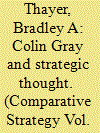

|
|
|
|
|
| Summary/Abstract |
The history of strategic thought is replete with contributors to the scholarly understanding of definitional issues of strategy and its application in various domains or to specific subjects. In any consideration of a strategic pantheon, Colin Gray ranks as a foremost strategist due to his contribution to the study of strategy from the perspective of theory, history, and policy. His contributions to strategy may be compared to Samuel Huntington’s in the related discipline of political science. As Huntington made a major impact in each subdiscipline of political science, so Gray’s contributions to strategy were comparable and thus define him as a major strategist: he developed a theory of strategy; analyzed strategy and conflict in a contemporary and historical context; made many contributions to nuclear and conventional strategy; helped to demarcate strategy as the object of scholarly study; and as a discipline to be taught. In each of these fields of study, Gray perceived what was generalizable over time and what was not.
|
|
|
|
|
|
|
|
|
|
|
|
|
|
|
|
| 2 |
ID:
182009
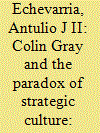

|
|
|
|
|
| Summary/Abstract |
As Colin Gray’s colleagues and friends well know, he invested considerable intellectual energy into championing the concept of strategic culture. His affinity for it traces to his 1981 article in International Security which described “national style” as derivative of strategic culture.1 However, his interest in it waned after the first decade of the twenty-first century. In fact, Colin’s 2006 SAIC paper, Out of the Wilderness: Prime Time for Strategic Culture, may well be the culminating point of his thought on the topic.2 It is a curious paper, in any case. It claims strategic culture is “vitally important” and admits to “no persuasive arguments to the contrary;” nonetheless, its core is a discussion of eleven of the concept’s “perils and pitfalls” which together amount to just such an argument.3 Colin could, of course, work both sides of an argument better than almost anyone. Indeed, he could promote dialectically opposing points of view simultaneously and artfully.
|
|
|
|
|
|
|
|
|
|
|
|
|
|
|
|
| 3 |
ID:
182015
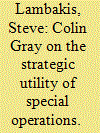

|
|
|
|
|
| Summary/Abstract |
The challenges Colin Gray faced to publish a fully fleshed out analysis of the contribution made by special operations to defense and security were many. James Kiras runs through his different efforts across the year in a nearby tribute. Colin believed that the best way to understand the strategic utility of special operations was to look at it through the lens of history, and, as one who worked closely with him on his project, I would like to lay out what I believe were his most significant insights on this subject and look at what might be called his pioneering, and sadly unpublished, work on the subject: Special Operations: What Succeeds and Why.
|
|
|
|
|
|
|
|
|
|
|
|
|
|
|
|
| 4 |
ID:
182007
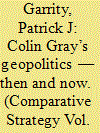

|
|
|
|
|
| Summary/Abstract |
In 1977, America seemed adrift in the world. The Vietnam War had soured many on its post-World War II internationalist foreign policy. The new president, Jimmy Carter, proclaimed that the United States must overcome its inordinate fear of communism, reduce military spending and overseas commitments, focus on international human rights, and become a much more restrained power. From this perspective, the massive nuclear arsenals of both sides rendered any sensible resort to war impossible, a reality which should be driven home diplomatically through stabilizing arms control agreements and practices.
|
|
|
|
|
|
|
|
|
|
|
|
|
|
|
|
| 5 |
ID:
182003
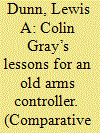

|
|
|
|
|
| Summary/Abstract |
I am very pleased to participate in this Symposium in honor of Colin Gray. I first met Colin over four decades ago in the mid-1970s when he had just arrived at the Hudson Institute from England. I also was a younger staff member at Hudson. Over the decades, Colin’s career went off in one direction – strategy and defense policy and posture – and my own in another – nuclear nonproliferation and arms control. We and our families remained friends – and every now and then we saw each other.
|
|
|
|
|
|
|
|
|
|
|
|
|
|
|
|
| 6 |
ID:
181998
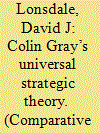

|
|
|
|
|
| Summary/Abstract |
As is evident from this current volume, Colin Gray made substantial theoretical contributions to a wide range of strategic subjects. The Leverage of Sea Power, Airpower for Strategic Effect, and Nuclear Strategy and National Style are just three of his major contributions to important subsets of the discipline Strategic Studies.1 Underpinning all of his work, however, is Colin’s appreciation of the process of strategy in general. In this way, Colin’s wider contributions were grounded in his universal strategic theory; that theory that applies to all strategic activity regardless of time, place, belligerent, technology or domain. Universal strategic theory enables us to unlock the core elements and process of strategy. Over the decades, Colin developed his universal theory in a number of key works: War, Peace & Victory, Modern Strategy, The Strategy Bridge, and Theory of Strategy.2 Indeed, Colin set himself the task, every 10 years or so, of writing a work with universal elements. In this way, he was able to reflect upon his own evolving appreciation of the subject.
|
|
|
|
|
|
|
|
|
|
|
|
|
|
|
|
| 7 |
ID:
181997


|
|
|
|
|
| Summary/Abstract |
I am certain of one thing: Colin Gray would be exasperated with claims that “Grand strategy is dead.”1 What he would have called a “banality” is commonplace these days.2 Some question the need for grand strategy; others contend the United States has lost the art of developing one.3 Not that Colin would disagree with the difficulty of strategy, or American shortfalls: “In war after war,” he noted, “America demonstrates an acute strategy deficit.”4 There is certainly plenty of evidence over the past two decades to suggest that a deficiency in conceptualizing and conducting national strategy afflicts the United States.
|
|
|
|
|
|
|
|
|
|
|
|
|
|
|
|
|
|
|
|
|